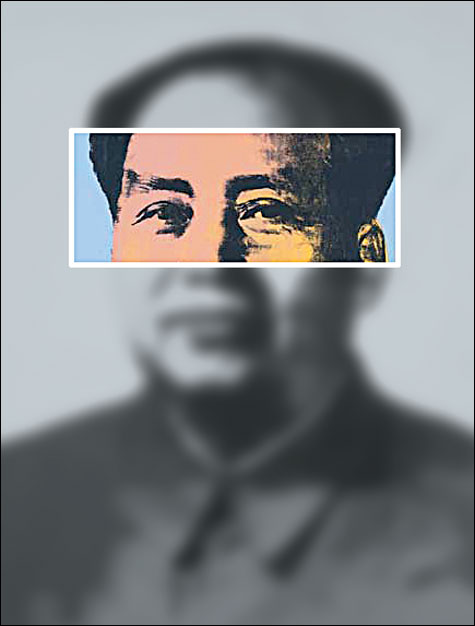
Photo illustration by K. Banks.
When the 21st century is old enough to support a sense of historical perspective, the date 8/8/08 may well be more significant than 9/11. The Olympic Games, which begin today, mark China’s modern coming of age.
“Modern” is an important qualification. As the planet’s oldest civilization with a recognizable sense of continuity, China has seen glory before. Gunpowder, paper, printing, and the compass were all products of its ancient genius. But for much of modern history, China was a nation on the margins: misunderstood and discounted, shamelessly exploited by Western powers and brutally pillaged by the Japanese.
Chairman Mao Zedong changed that — though it takes a strong constitution to stomach the murderous nature of his achievement.
Mao brought China neither peace nor prosperity. His Soviet-inspired agricultural policies led to famine; his Cultural Revolution transformed the country into a massive concentration camp. Median estimates of the total number dead as a result of Mao’s will and whim float around 50 million — give or take 10 million. Whatever the body count, most historians agree that Mao was the greatest mass murderer of all time.
It was Mao’s perverse achievement to forge in the smithy of the ancient Chinese soul the makings of a reconstituted superpower. Whether the nation’s ascendancy is because of Mao or in spite of him is almost irrelevant. The DNA is too tight to unravel, the duality too synthesized to deconstruct. Mao, or a version of him, is China. China, in some manifestation, is Mao. Mao’s embalmed corpse on display under glass in a mausoleum in Tiananmen Square taps into the Confucian ideal of ancestor reverence, and yet also transcends it. Mao, the great helmsman, washes all other ancestors with his wake.
The cult of Mao is a form of zombie politics; it is part of the voodoo employed by the shrewd, sophisticated bureaucrats who command the Middle Kingdom. They are, by Mao’s standards, faceless. The art of ruling the world’s most populous nation is to be one of a crowd. (During the terror of the Cultural Revolution, only Mao’s favor could save one from the chaos; to survive, the individual had to melt into the mob. Its memory disciplines the masses.)
China today is a dragon with a capitalist head and a communist heart. It is a living, breathing, thriving contradiction. Because the dragon is rising (the metaphor is no less apt because it is melodramatic), its momentum tends to mask its weak spots.
All things considered, however, China has ridden its momentum to exceptional advantage. It has, from a narrow and admittedly selfish American point of view, promised much (or appeared to promise much) and given little.
The vicissitudes of domestic politics aside, when President Richard Nixon knocked on China’s door 36 years ago, America had little to lose by recognizing the reality (denied — ironically — by people like Nixon) that China was in fact Communist.
More problematic for the average American worker was China’s entry into the World Trade Organization. It is hard to see how this benefited the average American. Yes, there are lower prices for an increasingly huge number of consumer goods made in China. But that appears to come as a direct loss of American jobs with little return in terms of access to Chinese markets.
The real winners of this development have been the multinational conglomerates that moved to China, and the financial institutions that backed them. Both of the presumptive presidential nominees, John McCain and Barack Obama, are curiously tight-lipped about future China policy. The reason for that may be simple: both are advised by people who make their livings outside of electoral politics, counseling multinationals that make mega-bucks in China.
Since Nixon approached China, the argument has gone that engaging the country economically would provide political leverage and ultimately result in liberalization of the repressive Chinese regime. According to the US State Department, China is still among the world’s nastiest governments — so much for Secretary of State Condoleezza Rice’s “iron law” that economic liberation will lead to political liberation.
Seeking raw materials and favors that sharpen its economic might, China sponsors terror in the Sudan and Zimbabwe and props up dictatorships in Myanmar (Burma) and North Korea. Its rape of Tibet has intensified, as has its crackdown on internal critics and dissidents. So secure is China in its ability to play on the hopes and avarice of the West, that it has — against all expectations (foolish though they might have been) — barred meaningful Internet access to the legions of journalists covering the Olympic Games.
Engagement was the reason China was awarded the Olympics. As a rule, cities, as opposed to nations, are awarded the Games in an effort to downplay international rivalries and accentuate the efforts of individual athletes. However, there have been two exceptions: the Berlin Games in 1936 were awarded by contract to Hitler’s Germany and the 2008 Games were awarded to the People’s Republic of China. The distinction may appear small and legalistic. But in each instance, the International Olympic Committee fractured its own protocols to massage egos that were as internationally aggressive as they were domestically repressive.